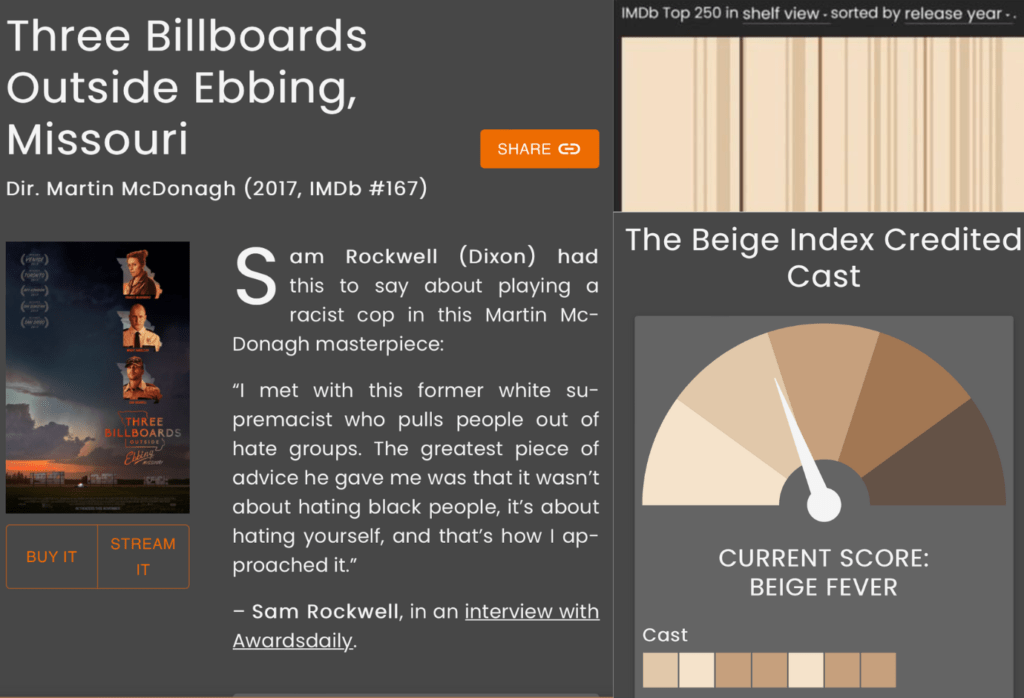You’ve heard of the Bechdel Test (asking whether an artistic work features at least two women who talk to each other about something other than a man) which seeks to correct the overwhelming sexism in Hollywood movies. But what about a test for racial diversity in films?
Introducing, The Beige Index. Co-developed by Brisbane-based award-winning author, Siang Lu and creative freelancer Jonathan O’Brien, the Index is the Bechdel Test for race. It explores ethnic representation on the IMDb Top 250 Films, and seeks to do for race, what the Bechdel Test does for feminism.
The site began as a ‘what if’ experiment between Lu and O’Brien – something that “quickly turned into a rather more rigorous endeavour”, the pair describe on their website.
Over 22 days, the pair watched 250 films and hired a small team to assess the quantitive racial diversity of the films. The films span from 1921 (including The Kid) to more recent films, including Top Gun: Maverick and Everything Everywhere All at Once.
Each film was given a “beige-o-meter score” — a BEIGE FEVER or CREAMY score means a film has little to no black or persons of colour actors, and received a low score, while films with higher numbers of black or persons or colour received a higher score (DOWN TO BROWN) on the Index.
The Index can be accessed through the year a film was released, the cast size, the name of the film, or its IMDB user score.
In total, out of 250 films, over 60 per cent of films were in the CREAMY category, 30 per cent were BEIGE FEVER while less than 3 per cent were in the DOWN TO BROWN category.
Only credited actors were included in the dataset, which means that extras, even when they had lines, were not included.
The dataset divided actors into a “Taxonomy of Ethnic Groups” — which expands on each racial and ethnic groups within the broader categories.
“White” included actors of Anglo-Saxon, Southern, Central and Eastern European, Celtic, the Caucasus, Gallic and Semitic descent.
“East Asian” included actors of Chinese, Japanese and Korean descent.
“Latin American” included actors of Mexican, Guatemalan, Honduran, El Salvadorian, Nicaraguan Argentinean, Dominican and Puerto Rican descent, among many others.
“Black” included Nigerian, Ethiopian, Egyptian, Congolese, South African, and Tanzanian descent, among several others.
“We performed tiered research to determine and record each actor’s ethnicity,” the developers explained on their website, using a range of biographical information gathered from multiple sources, including IMDb, first-person interviews, obituaries and other publicly available information.
When an actor’s race and ethnicity could not be confirmed, the researchers used a numerical beige-ness measuring tool invented by Renato Biasutti, an Italian geographer who used the von Luschan Scale to classify human skin tones.
“Someday, there may be the potential to use Google’s Monk Skin Tone scale combined with machine-driven frame analysis to calculate an extremely accurate Beige Score for every film in history,” the developers wrote. “But that is out of our scope, for now.”
O’Brien announced the launch of The Index on his Instagram account: “I co-created this thing with Siang Lu, my good friend and colleague, and it’s been one of the most challenging projects I’ve completed to date. And also one of the most satisfying.”
“This is a custom dataset featuring 250 films, 9,577 actors, and 22.5 DAYS of watchtime. And it’s all presented in a slick cross-platform app developed single-handed from scratch by yours truly.”
Lu’s debut novel, The Whitewash, which won the The Glendower Award, assesses the whitewashing of the Asian film industry, and was published by UQP earlier this month. Recently, Lu explained the Index was his “form of advocacy.”
“If you’re aware of the pattern, you can change or influence the pattern going forward,” He told The Financial Review.
Next time you want to know how racially diverse your favourite film casts are, turn to the Beige Index.


